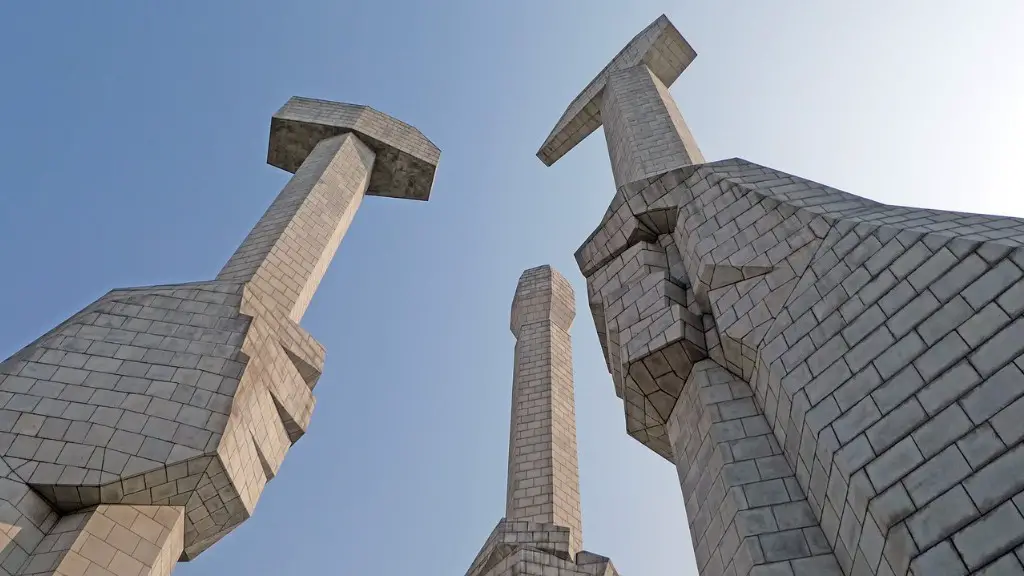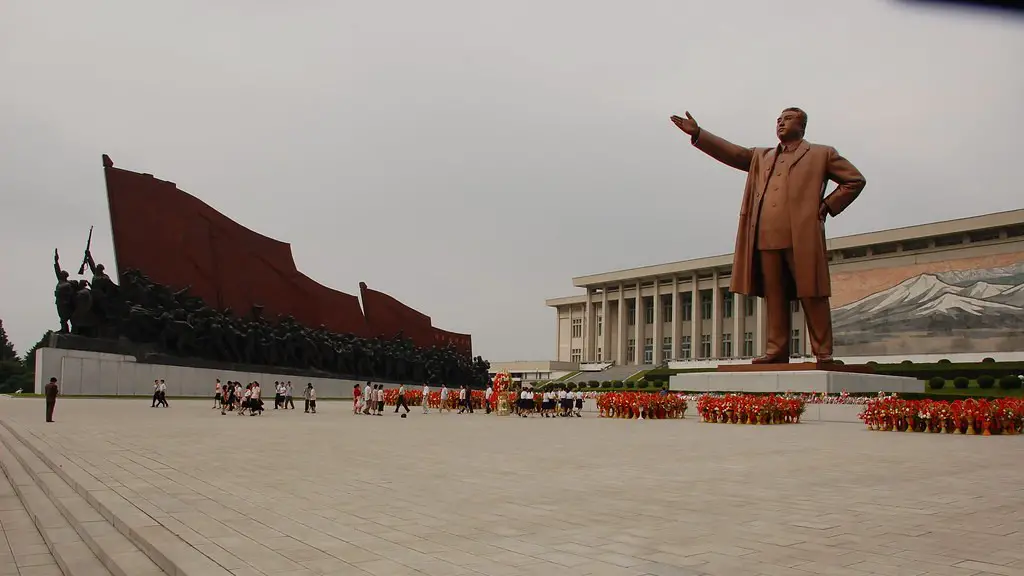Background on North Korea’s Nuclear Program
Since the 1990s, North Korea has been involved in the controversial pursuit of nuclear weapons. North Korea has been declared a nuclear state by the United Nations but has yet to demonstrate this capability by testing the weapons. According to experts, North Korea possesses at least 20 nuclear weapons and could potentially have up to 60. North Korea has conducted several missile tests, including a successful long-range intercontinental ballistic missile launch in 2017 that put parts of the United States within reach.
The country continues to amass uranium and plutonium for its nuclear arms program. North Korea produced nuclear material for bombs at a covert facility, the Yongbyon Nuclear Scientific Research Center. It also has a uranium enrichment plant at the same facility.
North Korea and the United States have had an acrimonious relationship over the last several decades. The U.S. imposed multiple economic sanctions on the country and has conducted joint military exercises with South Korea and other regional allies in the past.
In 2017, tensions between the U.S. and North Korea increased significantly after North Korean leader Kim Jong-Un threatened to launch a nuclear attack on the United States. This was part of North Korea’s strategy to gain recognition as a nuclear power on the international stage. Since then, North Korea has dialed back on its rhetoric and has been preparing for peace talks with the United States.
Why Does North Korea Want To Nuke America?
The short answer is to gain leverage. North Korea has long sought recognition by the international community as a nuclear power. The country has been isolated, and the ruling elites have viewed the pursuit of nuclear weapons as a way to gain recognition and status. It is believed that Kim Jong-Un is trying to use his nuclear arsenal as leverage to negotiate a better deal, such as sanctions relief and potentially some economic incentives.
North Korea has also used its nuclear weapons program as a way to fend off perceived aggression from the United States. In 2017, North Korea conducted multiple missile tests in response to joint military exercises conducted by the U.S. and South Korea. It is believed that these tests were meant to signal to the U.S. that North Korea was ready and capable of responding to any aggression.
Finally, North Korea has seen other countries, specifically those in the Middle East, embrace nuclear weapons as a means of self-defense. North Korea likely views its nuclear arms program in the same light.
North Korea’s Ballistic Missiles
North Korea’s pursuit of nuclear weapons has been enabled by its development of ballistic missiles. The country has conducted several successful missile tests, including a long-range intercontinental ballistic missile launch in 2017. According to experts, North Korea is continuing to develop more advanced and sophisticated delivery vehicles.
In 2017, the U.S. imposed economic sanctions on North Korea, in response to the country’s missile tests. These sanctions, however, have failed to deter North Korea from its pursuit of nuclear weapons. North Korea has been successful in developing both nuclear enrichment capabilities and ballistic missiles.
North Korea also has a burgeoning eavesdropping and hacking program, which it has used to steal information from the U.S. and other countries. The country continues to leverage its cyber capabilities to gain intelligence and information despite sanctions.
The Impact of North Korea’s Nuclear Program
The international community is understandably concerned about the implications of North Korea’s nuclear program. In addition to the risk of nuclear war, there is concern about the effect on regional stability. There is also fear that other rogue states, such as Iran, may seek to emulate North Korea. Finally, there is concern about the risk posed by North Korea’s cyber activities.
The United Nations has been leading efforts to denuclearize North Korea through economic sanctions and negotiation. In 2018, North Korea and the United States held a historic summit, in which North Korean leader Kim Jong-Un stated his commitment to denuclearizing the Korean peninsula. While the success of these efforts to denuclearize North Korea remain to be seen, there is a chance that the country could yet abandon its nuclear ambitions in exchange for economic and diplomatic rewards.
U.S.-North Korea Relations
U.S.-North Korea relations have been strained in recent years, culminating in the 2017 “fire and fury” rhetoric that raised fears of a nuclear war. Since then, there has been a thaw in relations between the two countries, as evidenced by the 2018 summit. Despite this, there remains distrust and uncertainty in the relationship.
The U.S. has maintained its “maximum pressure” campaign on North Korea, consisting of economic sanctions and diplomatic isolation. The Trump administration has stated that it would not lift the sanctions until North Korea demonstrates verifiable and irreversible steps towards denuclearization.
But there has also been a change in rhetoric from the Trump administration. During the 2018 summit, President Trump declared that North Korean leader Kim Jong-Un was a “very talented” leader and praised him for his commitment to denuclearizing the Korean peninsula.
International Response
The international community has been largely unified in its response to North Korea’s nuclear program. The United Nations Security Council has imposed economic sanctions on North Korea and has called on the country to denuclearize. In addition, countries such as South Korea and China have sought to increase diplomatic engagement with North Korea and are working to encourage the country to denuclearize.
The U.S. and its regional allies, such as Japan and South Korea, have maintained a hard-line stance towards North Korea and have refused to lift economic sanctions until North Korea takes verifiable and irreversible steps towards denuclearization. This approach is seen by some as taking a dangerous path towards potential conflict.
Implications
The implications of North Korea’s nuclear ambitions are far-reaching. As a nuclear power, the country has more freedom to engage in regional aggression, as well as the ability to threaten the U.S. and other countries. The risk of nuclear war is also a very real possibility with the continued development of North Korea’s weapons program.
The international community must remain vigilant in its efforts to enforce economic sanctions and to dissuade North Korea from continuing its nuclear weapons program. Unless North Korea is willing to negotiate in good faith and take verifiable steps towards denuclearization, the risk of nuclear war will remain.
Economic Sanctions
The international community has imposed economic sanctions on North Korea in order to pressure the country to abandon its nuclear weapons program. The U.S. has spearheaded this effort, with the intent of crippling North Korea’s economy. The sanctions have had some success, with the North Korean economy shrinking over the past two years.
However, there is evidence that the sanctions are not having the desired effect. North Korea has been able to skirt the sanctions by engaging in illicit activities such as arms trafficking and cyber theft. These activities are heavily sanctioned, yet North Korea continues to carry out these activities with impunity.
The success of the economic sanctions is dependent on the international community’s ability to enforce them. If North Korea continues to flout the sanctions, it is unlikely that the measures will have any effect on the country’s nuclear ambitions.
Conclusion
North Korea’s pursuit of nuclear weapons has been a major source of tension between the U.S. and the country. Despite the efforts of the international community, North Korea has continued its nuclear program. The U.S. and its regional allies have imposed economic sanctions in an attempt to pressure North Korea to denuclearize, but these sanctions have had limited success.
The international community must remain vigilant in its efforts to pressure North Korea to abandon its nuclear ambitions. Unless North Korea is willing to negotiate in good faith and take verifiable steps towards denuclearization, the risk of nuclear war will remain.





